13 Best Herbal Tinctures For Tinnitus
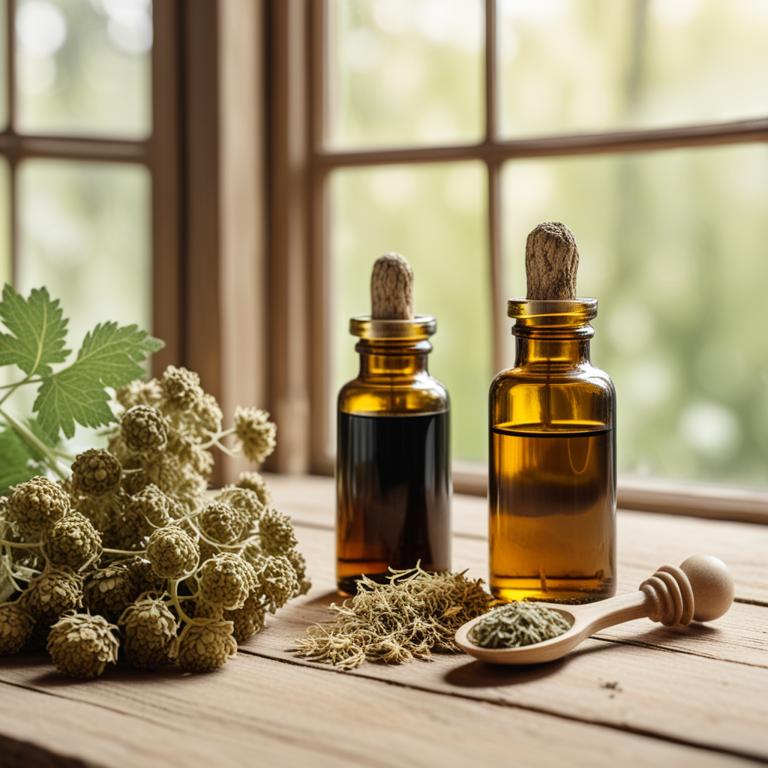
Herbal tinctures for Tinnitus are liquid extracts made from plants and herbs that have been traditionally used to alleviate the symptoms of tinnitus, a condition characterized by ringing, buzzing, or other sounds in the ears.
The benefits of herbal tinctures for tinnitus include reducing stress and anxiety, promoting relaxation, and improving overall hearing health.
Examples of herbal tinctures used to treat tinnitus include Ginkgo biloba, which improves blood flow to the ears and reduces inflammation; St. John's Wort, which has anti-inflammatory properties and can help to reduce stress and anxiety; Ashwagandha, which is an adaptogen that helps the body to adapt to stress and promotes relaxation; and Lavender, which has a calming effect and can help to reduce anxiety and promote better sleep.
Additionally, other herbal tinctures such as Ginseng, Rosemary, and Sage are also used to treat tinnitus, as they can help to improve circulation, reduce inflammation, and promote overall ear health.
According to "Presse medicale (Paris, France : 1983)", tinctures for tinnitus using Ginkgo biloba extract showed effectiveness in improving the condition of all patients, irrespective of the prognostic factor.
Below there's a list of the 13 best herbal tinctures for tinnitus.
- 1. Valeriana officinalis tinctures
- 2. Eucalyptus globulus tinctures
- 3. Silybum marianum tinctures
- 4. Lavandula angustifolia tinctures
- 5. Ginkgo biloba tinctures
- 6. Thymus serpyllum tinctures
- 7. Schisandra chinensis tinctures
- 8. Echinacea purpurea tinctures
- 9. Zingiber officinale tinctures
- 10. Avena sativa tinctures
- 11. Mentha x piperita tinctures
- 12. Bacopa monnieri tinctures
- 13. Rosmarinus officinalis tinctures
Also you may be interested in...
TODAY'S FREE BOUNDLE
Herb Drying Checklist + Herbal Tea Shopping List + Medicinal Herbs Flashcards
Enter you best email address below to receive this bundle (3 product valued $19.95) for FREE + exclusive access to The Aphotecary Letter.
$19.95 -> $0.00
1. Valeriana officinalis tinctures
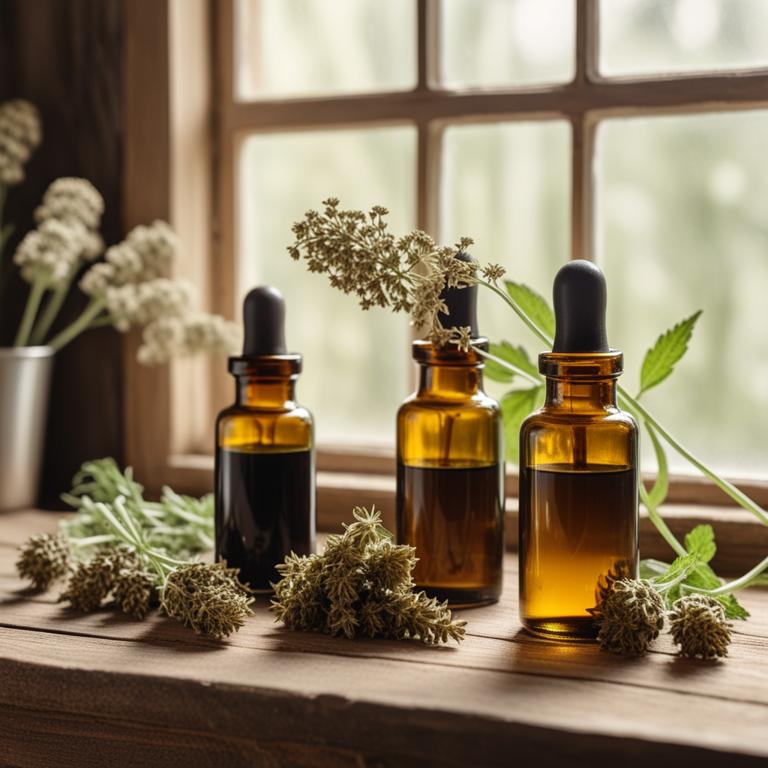
Valeriana officinalis tinctures, derived from the roots of the valerian plant, are often used to treat tinnitus, a condition characterized by ringing or other sounds in the ears.
The properties of this herbal preparation, including its sedative and anxiolytic effects, help to reduce stress and promote relaxation, which can alleviate tinnitus symptoms.
The bioactive constituents of valerian tincture, such as valerenic acid and isovaleric acid, are believed to contribute to its therapeutic effects by modulating the activity of neurotransmitters and reducing inflammation in the ear.
By using valeriana officinalis tinctures, individuals may experience benefits such as reduced tinnitus severity, improved sleep quality, and enhanced overall well-being.
2. Eucalyptus globulus tinctures
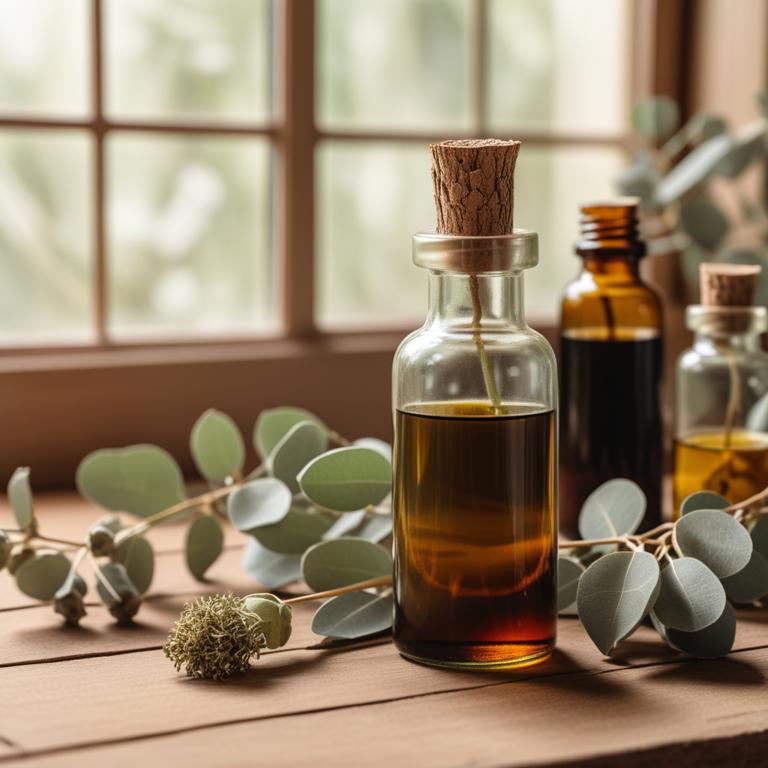
Eucalyptus globulus tinctures have been traditionally used to treat tinnitus, a condition characterized by ringing or other sounds in the ears.
The antiseptic and anti-inflammatory properties of this herbal preparation help to reduce inflammation in the ear and promote healing, thereby alleviating the symptoms of tinnitus.
The bioactive constituents, including eucalyptol, cineole, and limonene, have been shown to have analgesic and anxiolytic effects, which contribute to the reduction of tinnitus symptoms.
By reducing inflammation and promoting relaxation, Eucalyptus globulus tinctures can provide relief from tinnitus and improve overall ear health.
3. Silybum marianum tinctures
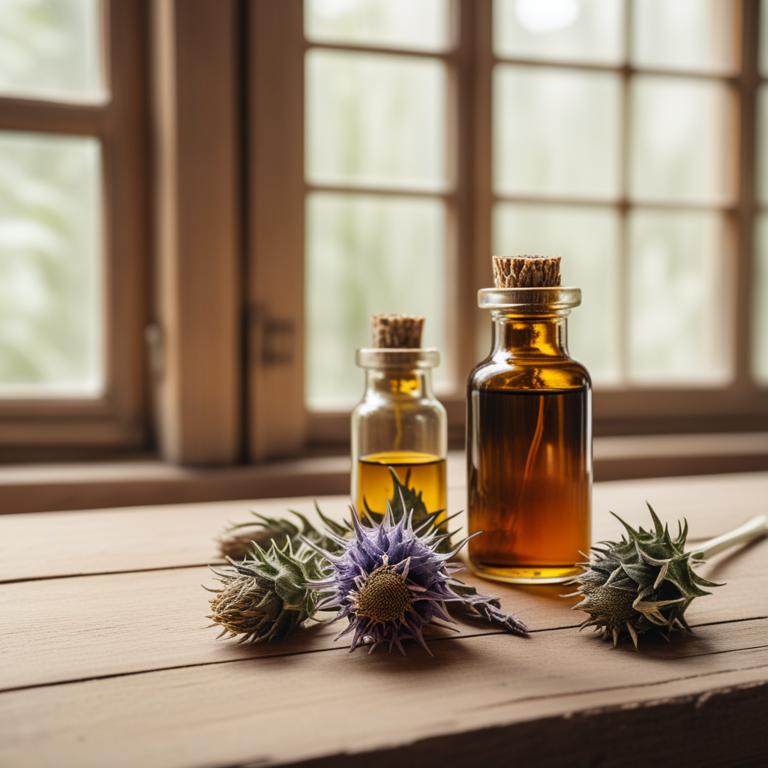
Silybum marianum tinctures have been traditionally used to treat tinnitus, an auditory condition characterized by ringing or other noises in the ears.
The anti-inflammatory and antioxidant properties of this herbal preparation help to reduce inflammation and oxidative stress in the auditory system, thereby alleviating symptoms of tinnitus.
The bioactive constituents, including flavonoids, saponins, and lactones, in Silybum marianum tinctures are thought to be responsible for their therapeutic effects, as they have been shown to inhibit the formation of free radicals and reduce inflammation.
By using Silybum marianum tinctures, individuals may experience improved hearing, reduced tinnitus symptoms, and enhanced overall auditory health.
4. Lavandula angustifolia tinctures
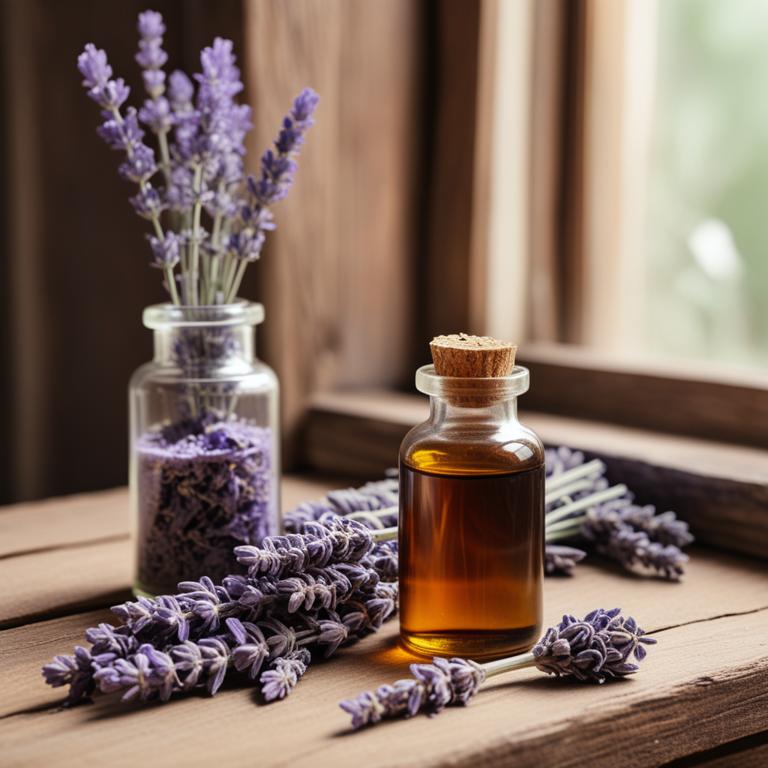
Lavandula angustifolia tinctures have been traditionally used to treat tinnitus, a condition characterized by ringing or other sounds in the ears, due to their anti-inflammatory, antiseptic, and anxiolytic properties.
The bioactive constituents of lavender, including linalool and linalyl acetate, help to reduce inflammation and promote relaxation, which can alleviate tinnitus symptoms.
By reducing anxiety and stress, lavender tinctures can help to calm the nervous system and alleviate the perception of ringing or other sounds in the ears.
Regular use of lavender tinctures has been reported to provide relief from tinnitus symptoms and improve overall sleep quality, making it a popular natural remedy for this condition.
5. Ginkgo biloba tinctures

Ginkgo biloba tinctures have been traditionally used to treat tinnitus, a condition characterized by ringing or buzzing in the ears.
The bioactive constituents of ginkgo biloba, such as flavonoids and terpenoids, help to improve blood circulation and reduce oxidative stress, which may contribute to the development of tinnitus.
By reducing inflammation and improving auditory nerve function, ginkgo biloba tinctures may help alleviate the symptoms of tinnitus, including ringing and buzzing sounds.
The benefits of using ginkgo biloba tinctures to treat tinnitus include improved hearing, reduced anxiety and stress, and enhanced overall auditory function.
Related Study
According to "Presse medicale (Paris, France : 1983)", Ginkgo biloba tinctures for tinnitus were shown to improve the condition of all patients, irrespective of the disease's site and periodicity.
6. Thymus serpyllum tinctures
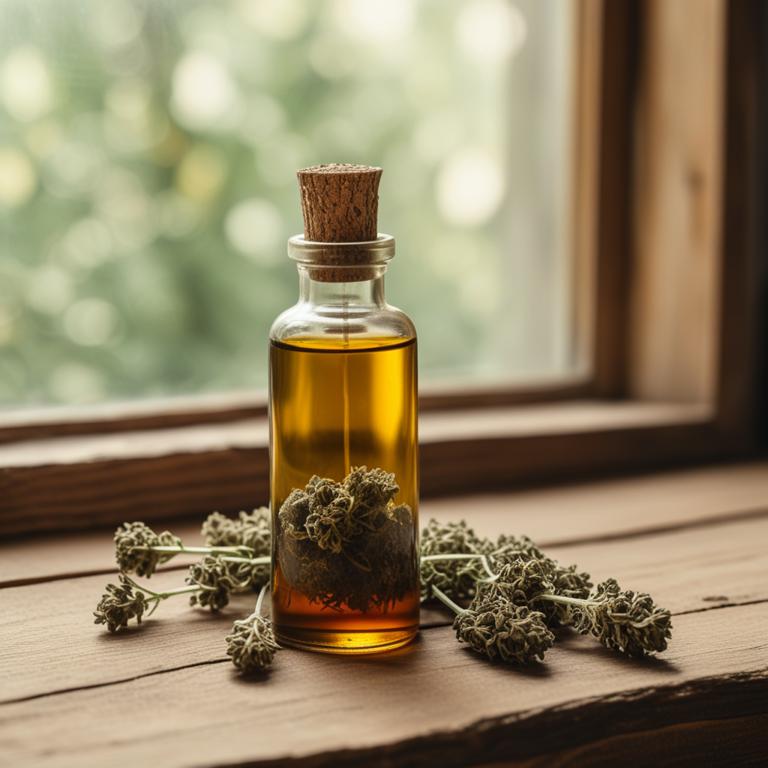
Thymus serpyllum tinctures, derived from the flowering plant thyme, have been used to treat tinnitus due to their anti-inflammatory and antioxidant properties.
The tinctures help to treat tinnitus by reducing inflammation in the ear and promoting blood flow, which can alleviate symptoms such as ringing and buzzing in the ears.
The bioactive constituents of thymus serpyllum tinctures, including thymol and carvacrol, have been shown to have analgesic and anti-inflammatory effects, helping to reduce pain and discomfort associated with tinnitus.
The benefits of using thymus serpyllum tinctures to treat tinnitus include reduced symptoms, improved sleep quality, and a decrease in overall stress and anxiety.
7. Schisandra chinensis tinctures
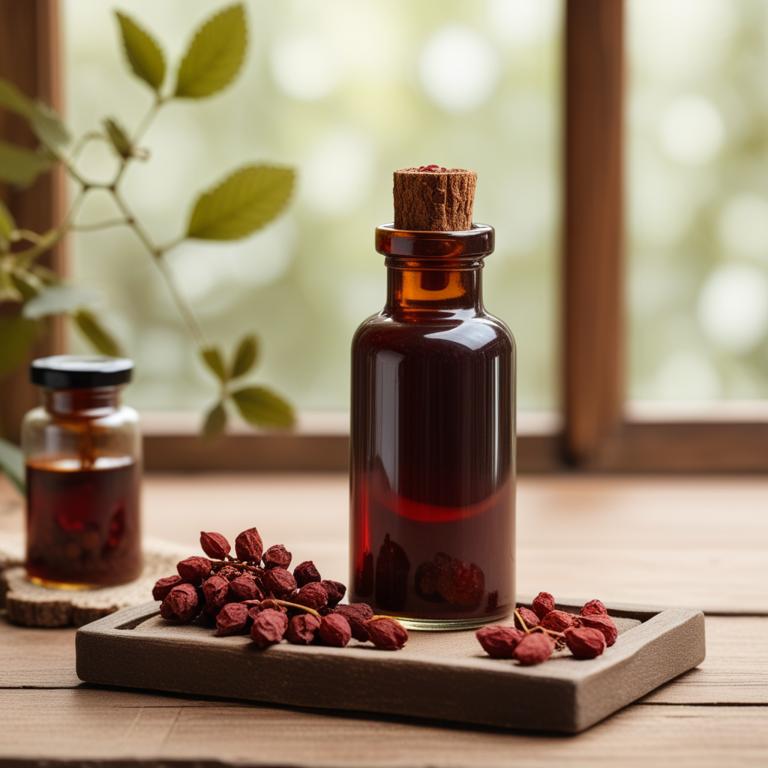
Schisandra chinensis tinctures have been traditionally used to treat tinnitus, a condition characterized by ringing or other sounds in the ears.
The antifungal and antioxidant properties of this herbal preparation help to reduce inflammation and promote overall ear health, contributing to its effectiveness in treating tinnitus.
The bioactive constituents, including schisandrins and lignans, in Schisandra chinensis tinctures have been found to possess anti-inflammatory and neuroprotective properties, which may help to alleviate tinnitus symptoms.
By using Schisandra chinensis tinctures, individuals can benefit from its potential to reduce tinnitus severity, improve sleep quality, and enhance overall well-being.
8. Echinacea purpurea tinctures

Echinacea purpurea tinctures have been traditionally used to alleviate tinnitus symptoms, and research suggests that this herbal preparation may indeed offer some relief from the condition.
The anti-inflammatory and antioxidant properties of Echinacea purpurea tinctures, which are primarily attributed to its bioactive constituents such as alkylamides, flavonoids, and phenolic acids, may help to reduce inflammation in the ear and alleviate tinnitus symptoms.
This herbal preparation may also help to protect the auditory system from oxidative stress and damage, thereby potentially reducing the severity of tinnitus.
The benefits of using Echinacea purpurea tinctures to treat tinnitus include reduced inflammation, improved antioxidant defenses, and potential long-term protection against auditory damage.
9. Zingiber officinale tinctures

Zingiber officinale tinctures, derived from the rhizome of the ginger plant, have been used to treat tinnitus, a condition characterized by ringing or other sounds in the ears.
The anti-inflammatory and antioxidant properties of Zingiber officinale tinctures help to reduce inflammation and oxidative stress in the auditory system, which are believed to contribute to the development of tinnitus.
The bioactive constituents of ginger, including gingerols and shogaols, have been shown to have analgesic and anti-inflammatory effects, which may help to alleviate tinnitus symptoms by reducing pain and inflammation in the ears.
By reducing inflammation and oxidative stress, Zingiber officinale tinctures may help to alleviate tinnitus symptoms, providing relief and improving overall hearing health.
10. Avena sativa tinctures
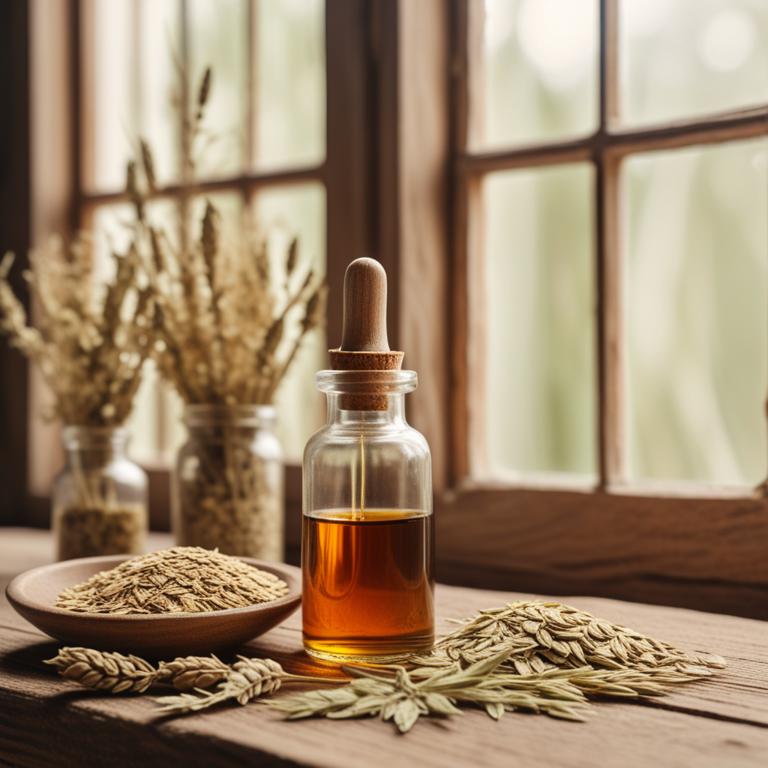
Avena sativa tinctures have been traditionally used to treat tinnitus, a condition characterized by ringing or other sounds in the ears.
The sedative and calming properties of Avena sativa tinctures help to reduce stress and anxiety, which are often contributing factors to tinnitus.
The bioactive constituents, including gamma-aminobutyric acid (GABA), ferulic acid, and avenacoside, in Avena sativa tinctures have been found to promote relaxation and reduce inflammation in the auditory system, ultimately alleviating tinnitus symptoms.
By using Avena sativa tinctures, individuals may experience reduced tinnitus severity and improved overall well-being, making it a potentially beneficial herbal remedy for this condition.
11. Mentha x piperita tinctures
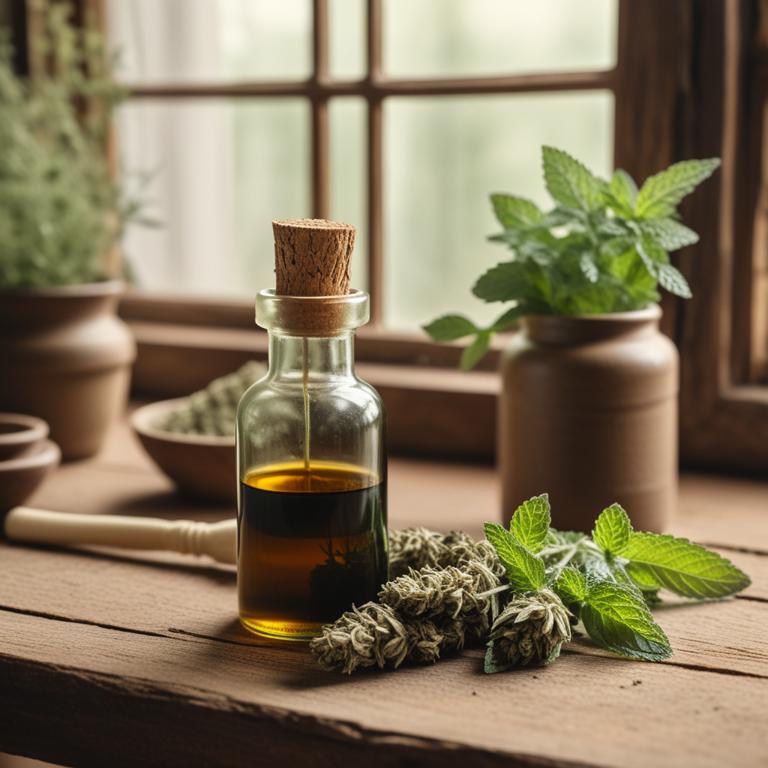
Mentha x piperita tinctures, derived from peppermint, have been traditionally used to treat tinnitus, a condition characterized by ringing or other sounds in the ears.
The antispasmodic and anti-inflammatory properties of this herbal preparation help to soothe and calm the auditory nerves, reducing the symptoms of tinnitus.
The bioactive constituents, including menthol, menthone, and limonene, are responsible for these therapeutic effects, as they modulate the neurotransmitters and reduce inflammation in the auditory system.
By using Mentha x piperita tinctures, individuals may experience relief from tinnitus symptoms and improved overall auditory health, making it a valuable natural remedy for this condition.
Related Study
According to Phytotherapy research : PTR, Mentha x piperita tinctures were not mentioned in the study for treating tinnitus, however, menthol/peppermint oil was found to have positive findings as an acute treatment, suggesting that Mentha x piperita, being a source of menthol and peppermint oil, may potentially offer some benefits.
12. Bacopa monnieri tinctures
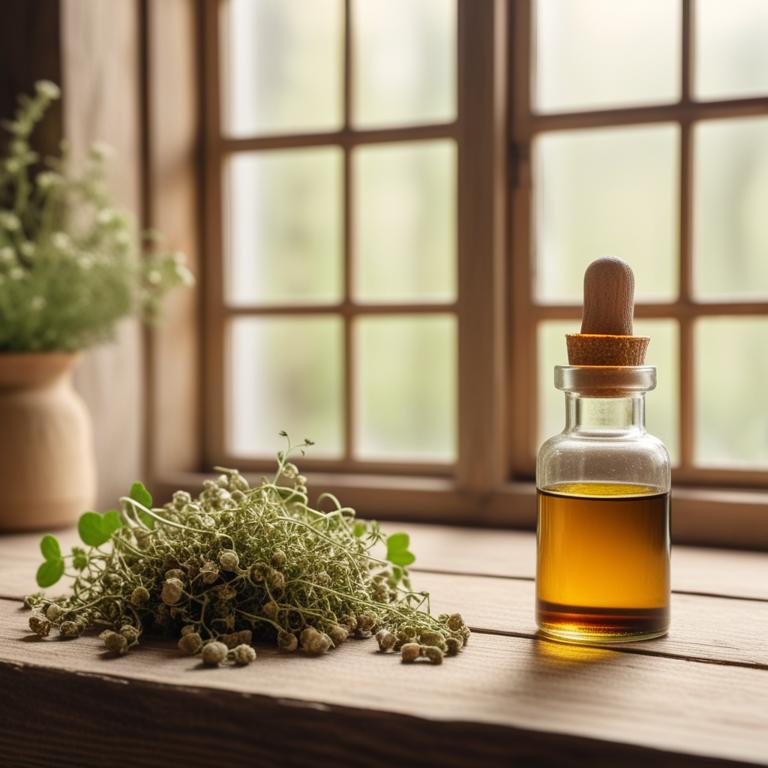
Bacopa monnieri tinctures have been traditionally used to treat tinnitus, an auditory condition characterized by ringing in the ears, due to their adaptogenic and antioxidant properties.
This herbal preparation helps to treat tinnitus by reducing inflammation and oxidative stress in the auditory nerve, thus alleviating the symptoms of the condition.
Bacopa monnieri tinctures contain bioactive constituents such as bacosides and saponins, which are believed to be responsible for their therapeutic effects on tinnitus.
The benefits of using Bacopa monnieri tinctures to treat tinnitus include reduced symptoms, improved sleep quality, and enhanced overall well-being, making it a popular natural remedy among those suffering from this condition.
13. Rosmarinus officinalis tinctures
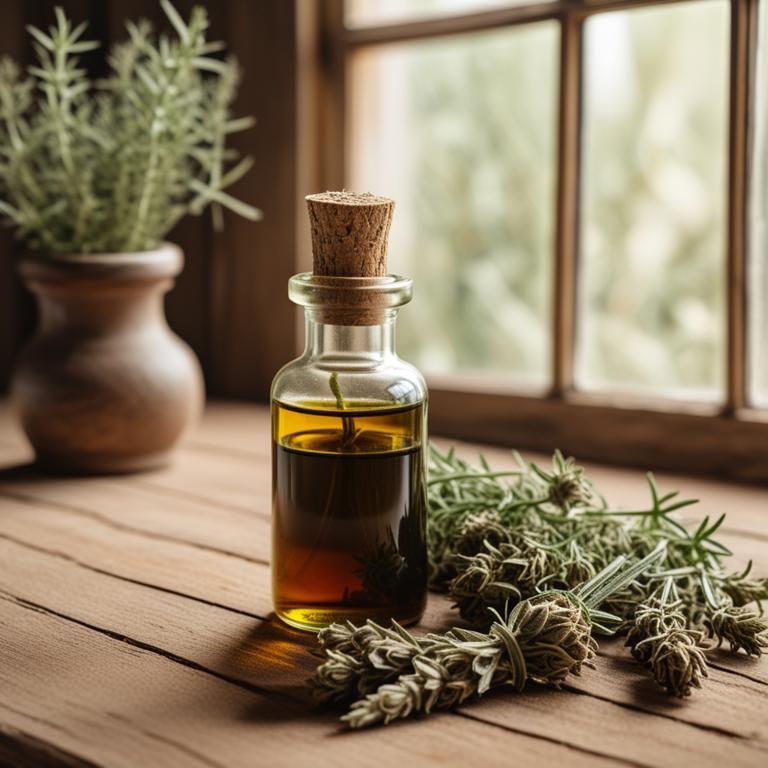
Rosmarinus officinalis tinctures have been explored as a potential remedy for tinnitus, a condition characterized by ringing or other sounds in the ears.
The properties of this herbal preparation, including its antioxidant and anti-inflammatory effects, help to treat tinnitus by reducing oxidative stress and inflammation in the auditory system.
The bioactive constituents of Rosmarinus officinalis, such as rosmarinic acid and camphor, contribute to its therapeutic effects by modulating the activity of neurotransmitters and improving blood flow to the ears.
The benefits of using Rosmarinus officinalis tinctures to treat tinnitus include reduced symptoms, improved hearing, and enhanced overall well-being, making it a promising natural remedy for this condition.